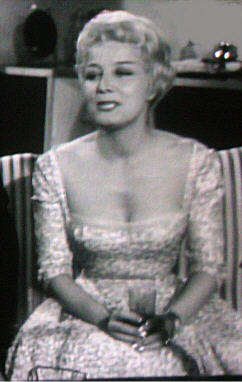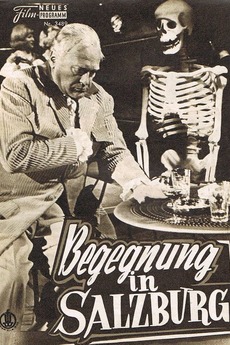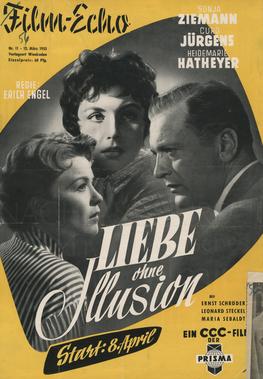
Curd Gustav Andreas Gottlieb Franz Jürgens was a German-Austrian stage and film actor. He was usually billed in English-speaking films as Curt Jurgens. He was well known for playing Ernst Udet in Des Teufels General. His English-language roles include James Bond villain Karl Stromberg in The Spy Who Loved Me (1977), Éric Carradine in And God Created Woman (1956), and Professor Immanuel Rath in The Blue Angel (1959).

Bernhard Wicki was an Austrian-Swiss actor, film director and screenwriter. He was a key figure in the revitalization of post-war German-language cinema, particularly in West Germany, and also directed several Hollywood films.

Carnival Story is a 1954 drama film directed by Kurt Neumann, produced by Frank King and Maurice King, starring Anne Baxter and Steve Cochran, and released by RKO Radio Pictures. It was made as a co-production between West Germany and the United States.

Mady Rahl was a German stage and film actress. Born Edith Gertrud Meta Raschke in Neukölln, Rahl trained as an actress and dancer. In 1935, she made her stage debut in Leipzig under the direction of Douglas Sirk and started her film career in 1936 with the movie The Mysterious Mister X. With her role in the circus drama Truxa (1937), Rahl became known to a wider audience. After the war, she sang with her friend Elfreide Datzig for the USO. She ultimately appeared in approximately 90 movies, several of them for UFA. In later years, she appeared frequently on television, while also pursuing her career in the theatre. She was occasionally active in German dubbing, lending her voice to Lucille Ball, Ma Gorg on the puppet series Fraggle Rock, and others.

Éva Márta Szőke Ivanovics, known professionally as Eva Bartok, was a Hungarian-British actress. She began acting in films in 1950, and her last credited appearance was in 1966. She acted in more than 40 American, British, German, Hungarian, French, and Israeli films. She is best known for appearances in Blood and Black Lace, The Crimson Pirate, Operation Amsterdam, and Ten Thousand Bedrooms.

Die Brücke is a 1959 West German anti-war film directed by Austrian filmmaker Bernhard Wicki. It is based on the 1958 novel of the same name by journalist and writer Gregor Dorfmeister. The story was based on an actual event, upon the personal report of a surviving veteran who in his own youth experienced a similar situation in World War II.
![<i>The Devils General</i> 1955 [[West Germany]] film](https://upload.wikimedia.org/wikipedia/en/3/32/The_Devil%27s_General.jpg)
The Devil's General is a 1955 black and white West German film based on the play of the same title by Carl Zuckmayer. The film features Curd Jürgens as General Harras, Marianne Koch, Viktor de Kowa, Karl John, Eva Ingeborg Scholz, and Harry Meyen. It was shot at the Wandsbek Studios in Hamburg. The film's sets were designed by the art directors Albrecht Becker and Herbert Kirchhoff.

Orient Express is a 1954 drama film directed by Carlo Ludovico Bragaglia and starring Silvana Pampanini, Henri Vidal, Folco Lulli, Eva Bartok, and Curd Jürgens. It was made as a co-production between Italy, France and West Germany.

Géza von Radványi was a Hungarian film director, cinematographer, producer and writer.

The Zürich Engagement is a 1957 West German comedy film directed by Helmut Käutner and starring Liselotte Pulver, Paul Hubschmid, and Bernhard Wicki.It is also known by the alternative title The Affairs of Julie.

Encounter in Salzburg is a 1964 French-West German drama film directed by Max Friedmann and starring Curd Jürgens, Nadia Gray and Viktor de Kowa.

Slap in the Face is a 1970 West German comedy film directed by Rolf Thiele and starring Curd Jürgens, Gila von Weitershausen, and Alexandra Stewart.

The Last Waltz is a 1953 West German musical romance film directed by Arthur Maria Rabenalt, and starring Eva Bartok, Curd Jürgens, and O. E. Hasse. It is an operetta film, based on the 1920 work The Last Waltz by Oscar Straus. It was one of several film adaptations of the operetta. It was shot partly at the Wiesbaden Studios in Hesse and on location in the Rhineland. The film's sets were designed by the art director Max Mellin.

The Disturbed Wedding Night is a 1950 West German comedy film directed by Helmut Weiss and starring Curd Jürgens, Ilse Werner, and Susanne von Almassy. It is based on the 1944 British play Is Your Honeymoon Really Necessary? by Vivian Tidmarsh. It was shot at the Sommervilla Studios in Grünwald in Bavaria. The film's sets were designed by the art directors Fritz Lück and Hans Sohnle. A couple's honeymoon is interrupted by the sudden arrival of the husband's first wife.

Prisoners of Love is a 1954 West German drama film directed by Rudolf Jugert and starring Curd Jürgens, Annemarie Düringer and Bernhard Wicki. It revolves around the story of a married couple separated by the Second World War. It was shot at the Bavaria Studios in Munich. The film's sets were designed by the art director Erich Kettelhut and Johannes Ott.

Love Without Illusions is a 1955 West German drama film directed by Erich Engel and starring Sonja Ziemann, Curd Jürgens and Heidemarie Hatheyer.

Without You All Is Darkness is a 1956 West German drama film directed by and starring Curd Jürgens. Eva Bartok, René Deltgen and Ursula Grabley also star.

The Mimosa Wants to Blossom Too is a 1976 West German comedy spy film directed by Helmut Meewes and starring Curd Jürgens, Eric Pohlmann and Horst Frank.

Stage Fright or Lamp Fever is a 1960 West German drama film directed by Kurt Hoffmann and starring Dunja Movar, Bernhard Wicki and Antje Weisgerber.

Roses in Autumn is a 1955 West German historical drama film directed by Rudolf Jugert and starring Ruth Leuwerik, Bernhard Wicki, Carl Raddatz and Lil Dagover. It is based on the 1894 novel Effi Briest by Theodor Fontane. It was shot in Eastmancolor at the Bavaria Studios in Munich. The film's sets were designed by the art director Walter Haag and Hans Kutzner. Location shooting took place around Göttingen in Lower Saxony and the island of Sylt in Schleswig-Holstein.






![<i>The Devils General</i> 1955 [[West Germany]] film](https://upload.wikimedia.org/wikipedia/en/3/32/The_Devil%27s_General.jpg)












